Red Hat Summit 2023: The Biggest Announcements
Ansible Lightspeed with IBM Watson Code Assistant, the Red Hat Developer Hub and Red Hat Trusted Application Pipeline and Trusted Content are some of the biggest announcements to come out of Red Hat Summit 2023 this week.
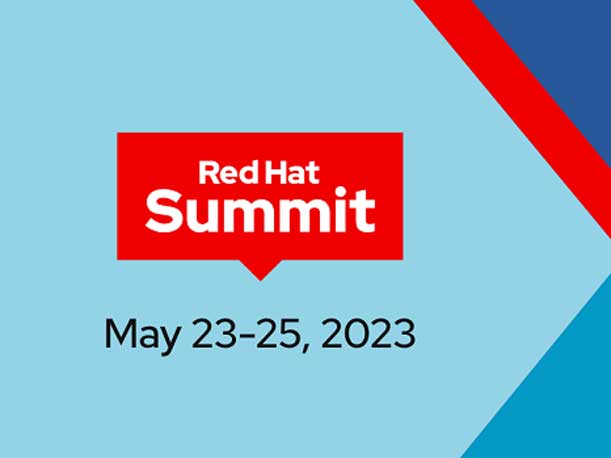
Generative artificial intelligence for Ansible. An enterprise-grade, unified, open developer hub. And new services in the Red Hat Trusted Software Supply Chain suite.
Ansible Lightspeed with IBM Watson Code Assistant, the Red Hat Developer Hub and Red Hat Trusted Application Pipeline and Trusted Content are some of the biggest announcements to come out of Red Hat Summit 2023 this week.
Red Hat, the Raleigh, N.C.-based IBM subsidiary and open software vendor, runs the event from Tuesday to Thursday in Boston.
[RELATED: New Dell-Red Hat Infrastructure Blocks Promise To Slash Networking OpEx]
Red Hat Summit 2023 News
Summit 2023 comes soon after the vendor announced plans to lay off upwards of 800 employees, about 4 percent of its global workforce – suggesting that innovation has continued despite the lower headcount.
Red Hat CEO Matt Hicks promised no cuts in sales and engineering and said the layoffs were due to the vendor needing to “rebalance” and decide what offerings were priority. The layoffs appear to have targeted project managers and customer success professionals.
Hicks also sought a cultural change with employees “willing to engage and learn the intersections between our teams and to manage them more directly, with fewer layers of interface.”
Some of the other news to come out of Summit 2023 include:
*An Event-Driven Ansible Offering
*Updated capabilities for Red Hat Insights for RHEL
*Red Hat Advanced Cluster Security Cloud Service
About 80 percent of Red Hat’s overall sales come through the channel, according to CRN’s 2023 Channel Chiefs. In the 2022 edition, Red Hat disclosed that it had 7,000 worldwide channel partners, 1,500 of them in North America.
IBM has 55,000 channel partners worldwide, with 12,000 of them in North America, according to CRN’s 2023 Channel Chiefs.
These are the biggest announcements from Red Hat Summit 2023.
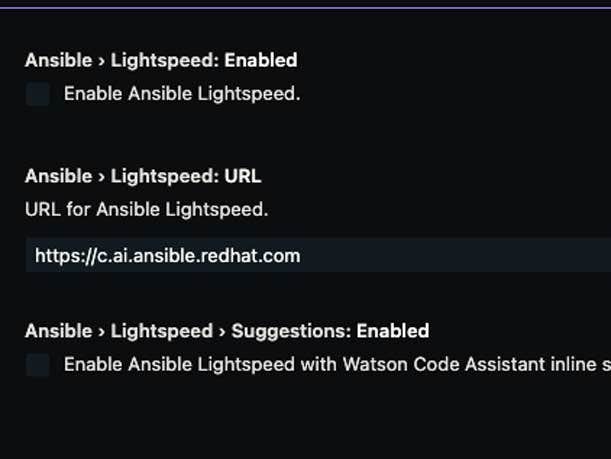
Ansible Lightspeed
In June, Red Hat will make an open beta available for Ansible Lightspeed with IBM Watson Code Assistant, a generative artificial intelligence (AI) service for Red Hat’s Ansible automation offering.
Lightspeed promises more consistent, more accurate and faster automation adoption across organizations, according to Red Hat. It uses natural language processing and integrates with Watson Code Assistant to access IBM Foundation Models built on Red Hat OpenShift.
Ansible users gain the ability to input prompts in plain English and more easily translate domain expertise into Yaml code for making and editing playbooks, according to Red Hat.
Lightspeed represents a new phase in Red Hat’s Project Wisdom, a collaboration with parent company IBM to give Ansible new capabilities through a trained AI model.
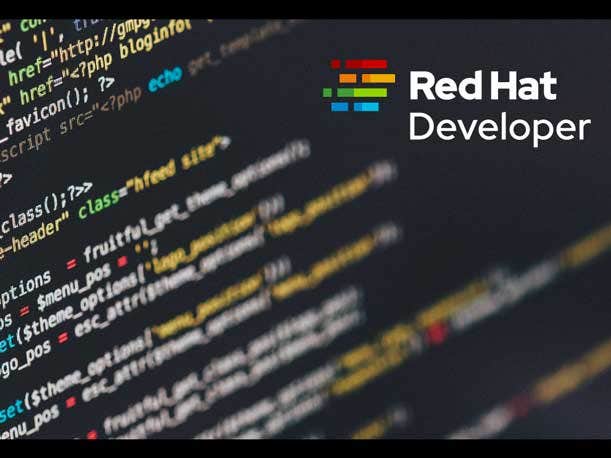
Red Hat Developer Hub
Later this year, Red Hat will make a developer hub generally available from its container catalog.
The enterprise-grade, unified, open portal aims to streamline development with a supported and opinionated framework, according to the vendor. Developer Hub provides curated tools, languages and resources with the promise of better applications and reduced friction across environments such as Kubernetes and Red Hat’s OpenShift.
The portal has self-service capabilities and guardrails for cloud-native app development and promises to ensure security and governance across the enterprise, according to Red Hat.
It has pre-defined, pre-architected and supported templates meant to help developers get apps into production faster and more securely.
Developer Hub was created from the Cloud Native Computing Foundation (CNCF) incubating open source project Backstage, according to Red Hat.
The vendor also has six plugins to integrate key systems into Backstage, with more coming in future releases.
The plugins work across all Backstage installations, according to Red Hat. They include:
*Application topology for Kubernetes
*Open Cluster Manager’s MultiClusterHub and MultiCluster Engine
*Container image registry for Quay
*Tekton pipelines
*Keycloak authentication and authorization Argo CD Git operations (GitOps)
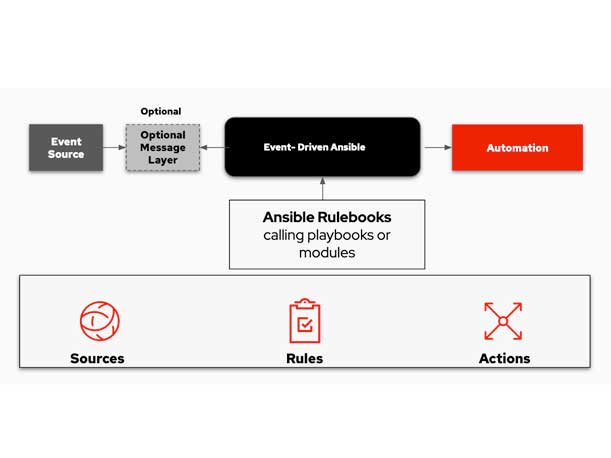
Event-Driven Ansible
In June, Red Hat will roll out Event-Driven Ansible as part of Ansible Automation Platform 2.4.
Event-Driven Ansible promises to expand how users activate automation across hybrid cloud, according to Red Hat. It can reduce the risk of IT infrastructure errors and degradation, conserve resources and free IT workers for logic, application quality improvements and speeding up deployment.
The offering connects infrastructure and app observability tools, according to Red Hat. When it receives third-party tool events, it automatically determines next steps and acts. IT workers can pre-determine and define rules for unresponsive system processes, unauthorized access requests and other situations. Users can chain multiple events together.
Users can manage dynamic cloud-native conditions for remediating system outages, security alerts and other service disruptions, according to the vendor. Password resets, compute and storage adjustments, service ticket augmentation, configuration drift addressing and backing up are some of the manual, error-prone tasks that Event-Driven Ansible seeks to reduce.
Event-Driven Ansible works for traditional hardware, network infrastructure, cloud, edge and other environments, according to Red Hat.
Cisco ThousandEyes, CyberArk, Dynatrace, F5, IBM Instana, IBM Turbonomic, Palo Alto Networks and Zabbix are some of the third-party tool integrations available for Event-Driven Ansible. More integrations are expected, according to Red Hat. Event-Driven Ansible also supports custom integrations.
Kyndryl, World Wide Technology and other system integrators are already trained on the offering, according to Red Hat.
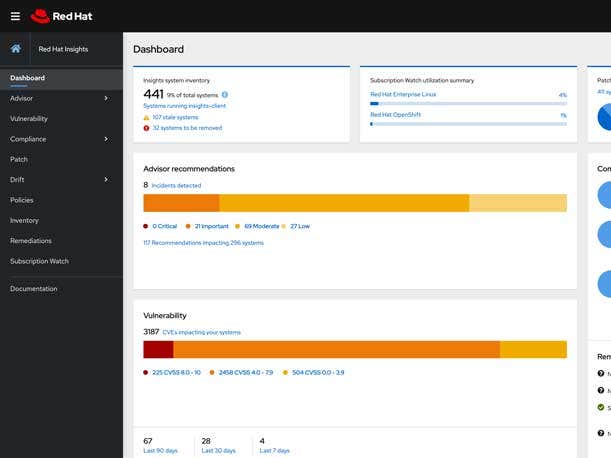
RHEL Insights Updates
During Summit 2023, Red Hat updated management capabilities that aim to reduce enterprise Linux complexity across hybrid cloud.
The enhancements for Red Hat Insights for Red Hat Enterprise Linux (RHEL) are available through any web browser accessing the console and provide a single user interface for deployment management, according to the vendor.
Systems administrators won’t need to interact with the command line or develop a deep understanding of Red Hat Satellite Server or other Linux management systems – although Satellite Server is still the go-to for advanced Linux management while supporting air-gapped and disconnected deployments, according to Red Hat.
Users can act on multiple server groups at the same time with patch templates. Red Hat Insights can provide predictive analytics and find potential bugs, misconfigurations and security vulnerabilities, according to the vendor.
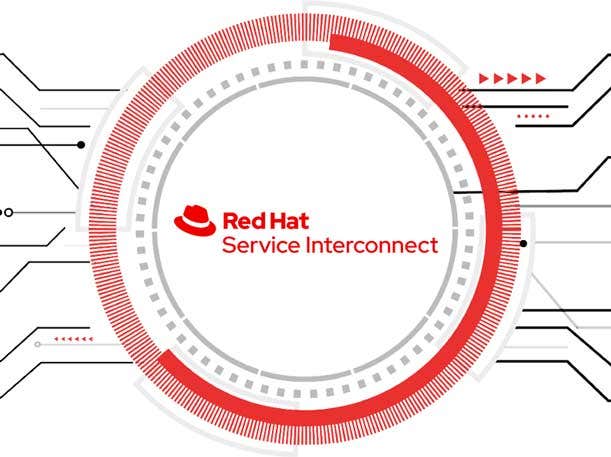
Red Hat Service Interconnect
During Summit 2023, Red Hat announced Service Interconnect as a way to connect apps and microservices across open hybrid cloud.
Interconnect, based on the Skupper.io open source project, promises an easier way for developers to migrate apps across environments and communicate across container clusters in different networks.
The service also promises container cluster communication even behind firewalls without complex configurations and overhead, according to Red Hat.
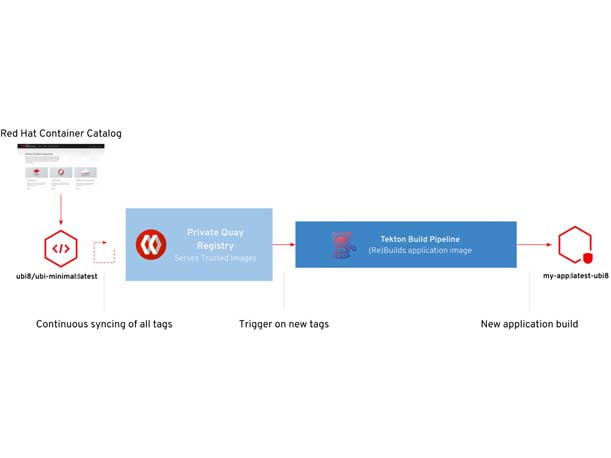
Trusted Software Supply Chain Updates
Red Hat Trusted Application Pipeline and Red Hat Trusted Content are two new services for the Trusted Software Supply Chain suite of cloud services.
Trusted Application Pipeline promises continuous integration (CI) and continuous delivery (CD) with built-in security gating, according to the vendor.
Trusted Content leverages open source software dependencies and verified packages with improved delivery and security, according to Red Hat.
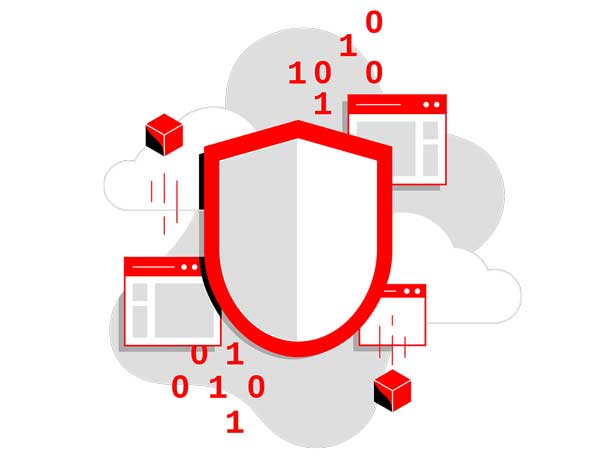
Red Hat ACS Cloud Service
Red Hat has launched limited availability for Advanced Cluster Security (ACS) Cloud Service, available in the Amazon Marketplace.
The service unites Kubernetes-native security capabilities with Red Hat-managed offer support, according to the vendor. It supports Red Hat OpenShift on private and public clouds as well as Amazon Elastic Kubernetes Service (EKS), Google Kubernetes Engine (GKE), Microsoft’s Azure Kubernetes Service (AKS) and other container platforms.
Users can scale security capabilities across multiple clusters on-premises and in the cloud, according to Red Hat.
ACS comes from Red Hat’s 2021 StackRox acquisition.

OpenShift AI Upgrades
During Red Hat Summit 2023, the vendor detailed upgrades for OpenShift AI, which underpins the generative AI services of IBM AI platform Watsonx.ai.
The upgrades include development pipelines for artificial intelligence (AI) and machine learning (ML) experiment tracking and automated ML workflows.
A model serving feature allows GPU support for inference and custom runtimes to improve inference performance.
And model monitoring gives users a centralized dashboard for performance and operational metrics, according to Red Hat.
OpenShift AI promises a standardized foundation for making production AI and ML models and running the apps, according to Red Hat. OpenShift AI has optional offerings including Anaconda, IBM Watson Studio, Intel OpenVino and AI Analytics Toolkit, Nvidia AI Enterprise and Starburst.